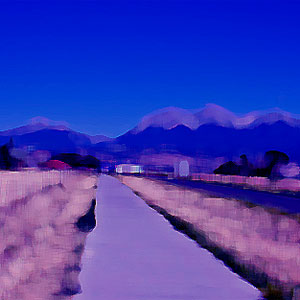Please visit our new site!
Fiction
Road's end
From the LabLit short shory series
3 March 2012
www.lablit.com/article/709

A lab doesn't challenge, provoke or object – a lab simply is
In my experience, which I'd like to think is considerable, labs are depressing. There's a clinical sterility to the decor, a neutrality that communicates itself through the white benches, the cream walls, the hermetically sealed windows and the array of coats hanging by the door.
Over the benches lies the familiar chaos of reagent bottles: Murky PBS; sunglass-brown DMSO; emerald Fast Green. That switch-on buzz of the fridge-freezer, the regular beeps of the Q-PCR machine, the whisper of the lamina hoods. The scent of a thousand solvents, the fish-stink of TEMED, the pungency of beta-mercaptoethanol, the warm nausea of culture media. Labels, markers, pipettes. Blotting kits, 96-well plates, eppendorf tubes. Syringes.
A lab doesn't encourage, invite or reassure. A lab doesn't challenge, provoke or object. A lab simply is. It's a means. An empty space, a void where questions can turn into answers with even more questions.
A canvas. Tabula rasa.
I've been standing at the lab's door for five seconds before everyone looks up at me. Actually, not everyone; A huge Coomassie Blue bottle obscures me from the busy postdoc in the corner who's bobbing her head to some unheard beat in her headphones while tediously labelling her tubes.
But most of them, they see me.
It's awkward – the kind of awkward that precedes "goodbye".
I've worked in this lab for four years. Four years of eighty-hour weeks, no weekends, Chinese takeaweys and an entire life narrowing to the spear-tip point of a publication.
I could argue that I can't do it anymore. When people say that scientists are human, they usually mean that we make mistakes too, or that we're not free from prejudice, or that we culture egos more than cells. What they don't mean, what they don't think of meaning, is that scientists are people too; people with needs, dreams, desires, and a finite amount of energy.
But that's not it. Scientists are driven, and they can keep going as long as there's road.
And I guess that's it. I'm out of road. Three grant proposals and all turned into the proverbial toilet paper. A network of bigwig lab heads that has suddenly unravelled. Everybody knows you at the conference galas. When you're hot off the press. When you're driving the next high impact factor and they want a ride. But come knocking without something in it for them and you won't get past their secretary.
Same as everywhere.
The people in the lab, my soon-to-be ex-colleagues, stare at me for a while. They all know, of course. There are no secrets in a lab – except maybe from the boss. People spend this long together, they're bound to get into each other's lives one way or another. They're bound to become each other's lives.
They're all staring at me now, including the postdoc who's pulled her headphones off. I look back at them over the reagent bottles, the smells, the sounds and the canvas and I feel like I have to say something. After all, I was the most senior person in there.
And that's the thought that keeps my mouth shut. Until last week, I was also the most successful in the lab. The papers. The confidence. The name.
What am I supposed to say? "That's life"? "It's a gamble"? "I'll be back"? The higher you are, the harder you fall – and the less you speak.
I just breathe in, take it all in for a moment – the sight, the sound, the smell – and then I nod, turn around, let go of the door, and walk down the pale corridor.
In my experience, which I'd like to think is considerable, labs are depressing.
And I will miss them.
